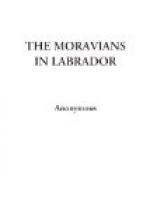Amid the trials which the brethren had to encounter, they acknowledge, with gratitude, the mercies that intervened: they witnessed many instances of the faithful leading of the Holy Spirit among the Esquimaux, particularly in the return of many to the good Shepherd, from whom they had strayed—and during the winter, the station of Hopedale was preserved from moral contagion by a striking providence. Some heathen who had set out to seduce their countrymen to go to the south, were overtaken at sea by a violent storm, which dashed their large boat in pieces, and being thrown on an unknown desert region, where no assistance could be obtained, perished miserably by cold and hunger.
At the close of 1819, brother Schreiber returned to Europe, and brother Kohlmeister succeeded him as superintendant of the Labrador missions, for which he was well adapted, both by his knowledge of the country and the language. In the former year he had performed a voyage from Okkak to Nain, very different from that remarkable journey in 1804. The weather was fine and warm, with a gentle favourable breeze, and the varied scenery was delightful. He doubled the promontory of the Kiglapeit mountains with the greatest ease, and was wafted through the narrow channel to Nain, charmed with the verdure that decked the shores, the woods in foliage, the hills covered with grass, and the vallies spangled with innumerable flowers. Early next year he visited Hopedale, and the weather being again fine, he accomplished the journey in two days. The dogs drew the sledge over the frozen snow with great rapidity; no English post-horses could have done better. He had formerly ministered in this settlement, and the inhabitants came out to some distance to meet, and bid him welcome. “I was deeply affected,” says he, in a letter to Mr Latrobe, “on again entering this place, in which I had spent so many




